General News
Meropi Kyriacou Honored as TNH Educator of the Year
NEW YORK – Meropi Kyriacou, the new Principal of The Cathedral School in Manhattan, was honored as The National Herald’s Educator of the Year.

May 13th:
On this day in 1995, a 6.6 magnitude earthquake rocked Northern Greece and severely damaged about 5000 houses, churches, and schools in the Kozani and Grevena prefectures. Fortunately there were no recorded fatalities and only about 20 light injuries were reported (this could be because there was a foreshock a few minutes before that forced residents to move out of their houses). It was the largest earthquake in Greece in the decade leading up to the catastrophic event. The earthquake was unexpected in the sense that the epicentral region was assumed to be of low seismic risk. The main shock was preceded by several foreshocks and followed by intense aftershock activity that lasted several months. Somewhat surprising, Greece experiences the highest seismicity in western Europe.
May 14th:
On this day in 1962, Princess Sophia of Greece married Don Juan Carlos of Spain. Princess Sophia was born on November 2, 1928 in Psychiko, Athens, the eldest child of King Paul of Greece and his wife, Queen Frederica. She studied childcare, music, and archeology and was a reserve member, alongside her brother Constantine, of Greece’s gold medal-winning sailing team in the 1960 Summer Olympics. Sophia met her paternal third cousin (they are both descendants of Queen Victoria of England), Juan Carlos of Spain, on a cruise in the Greek islands in 1954 and then reconnected with him at the wedding of the Duke of Kent in 1961. The couple was married in Athens in three separate ceremonies: at the Catholic Cathedral of Saint Dionysius; at the Greek-Orthodox Metropolitan Cathedral of the Virgin Mary; and at the Royal Palace in Athens (a civil union ceremony). Sophia converted from Greek Orthodoxy to Roman Catholicism to become more palatable to Catholic Spain, and thus relinquished her rights to the Greek throne. Along with this came the usual Latinization of her Greek name from Sophia, to the Spanish variant, Sofia. The couple ruled over Spain for 29 years and had three children: Elena, Cristina, and Felipe.
May 16th:
On this day in 1948, CBS news correspondent George Polk’s body was found floating in Salonika Bay near Athens. Polk was an American journalist who was murdered during the Greek Civil War, which he was covering, in 1948. The war was between the ultra-conservative Greek government’s army, which was backed by the United States, and the communist rebels. Polk was found dead – shot at point blank range, blindfolded, bound with twine by the hands and feet, pockets still full of money and personal effects – and to this day, there is great controversy about who killed him (some say it was the CIA or secret agents from Great Britain, others say it was Greek communist guerillas, and yet others say it was Greek Royalists). A few months following Polk’s death, the Polk Award was established in his honor which continues to be presented by the Polk Awards Center of Long Island University which focuses on the ‘intrepid, bold, and influential work of reporters – placing a premium on investigative work that is original, resourceful, and thought-provoking.’
May 17th:
On this day in 1902, Greek archaeologist Valerios Stais, along with his mathematician cousin Spiridon Stais, discovered the Antikythera mechanism, an ancient mechanical analog computer. The Antikythera mechanism was found in 45 meters of water in an Antikythera shipwreck off Point Glyphadia on the Greek island of Antikythera (located between Kythera and Crete). The wreck was found by a group of Greek sponge divers, who retrieved numerous artifacts, including bronze and marble statues, jewellery, coins, and the mechanism. All of the artifacts were transferred to the National Museum of Archaeology in Athens, where Valerios was the Director, for storage and analysis. Initially no one knew what the mechanism was until Spyridon identified the gears in the mechanism. We now know that the clock-sized device contained an elaborate collection of about 30 interlocking, spinning gears that controlled dials designed to calculate astronomical positions and eclipses. By turning the hand crank of the mechanism, the gears spun, causing the hands of the dials to move, allowing the user to accurately predict eclipses and the passage of celestial bodies through the sky. According to Jo Marchant of the Smithsonian, “nothing as sophisticated [as the Antikythera mechanism], or even close, appears again for more than a thousand years.”
NEW YORK – Meropi Kyriacou, the new Principal of The Cathedral School in Manhattan, was honored as The National Herald’s Educator of the Year.

RAFAH, Gaza Strip (AP) — Sabreen Jouda came into the world seconds after her mother left it.
VENTURA, CA – Greek-American George Christie was featured on Fox News Digital (FND) for his time in the Hells Angels, recounting the moment he decided to quit the motorcycle club he had formerly led.
NICOSIA - The suspending of asylum applications from Syrian refugees on Cyprus has now been followed by President Nikos Christodoulides saying the island country that’s a member of the European Union can’t take any more in.
WASHINGTON - Although human rights groups have chided Greece’s record in dealing with refugees and migrants, alleging pushbacks the government denied happened, the US State Department said Greece’s record is essentially status quo.
While Greece is hoping to lure more foreign companies - especially American - Greek companies are showing interest in investing in the United States to take advantage of aid for environmental and other projects being offered.